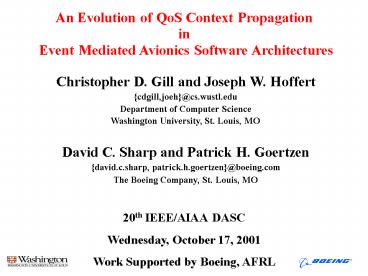DASC 01 Talk PowerPoint PPT Presentation
1 / 11
Title: DASC 01 Talk
1
An Evolution of QoS Context Propagation in
Event Mediated Avionics Software Architectures
Christopher D. Gill and Joseph W.
Hoffert cdgill,joeh_at_cs.wustl.edu Department of
Computer Science Washington University, St.
Louis, MO
David C. Sharp and Patrick H. Goertzen david.c.sh
arp, patrick.h.goertzen_at_boeing.com The Boeing
Company, St. Louis, MO
20th IEEE/AIAA DASC Wednesday, October 17,
2001 Work Supported by Boeing, AFRL
2
Motivation
- Avionics mission computing use-cases have
differing levels of QoS requirements - E.g., situational awareness vs. actuator control
- QoS management capabilities trade off with
temporal and spatial overhead factors
- A given application should receive just enough
QoS management - i.e., sufficient control with minimal overhead
- Goal an architecture and implementation
framework that scales across use-cases - Supports re-use of QoS management capabilities
- Can be customized to specific use-cases
- Application only pays for QoS management it
uses
3
Motivation, Continued
- QoS context is propagated for end-to-end
management - In-band, i.e., in the run-time path of the
managed info - Or, out-of-band, i.e., through another path
- Thread model for QoS context propagation well
known - E.g., in-band pass a timeout parameter to a
function call - E.g., out-of-band set the priority of a thread
- E.g., distributable thread scheduling in
DSRTCORBA2
- We consider implications for an event-mediated
model - I.e., in-band with the event several
out-of-band techniques - Event, rather than thread is primary concurrency
abstraction - Useful for highly asynchronous distributed
applications - E.g., situational awareness in avionics mission
computing
4
Kinds of Propagation Models
5
Original Static Priority Model
- Event pushed to dispatcher
- Event carries handle to its static QoS info
(prio) - Low space overhead
- Dispatcher calls scheduler w/ handle, gets prio
lane - Low time overhead
Prioritized OS Threads
- Dispatcher enqueues event in (pre-configured) lane
Dispatcher
Dispatch Scheduler
6
Hybrid Static/Dynamic Model
- Event carries static handle dynamic QoS info
- E.g., deadline, WCET
- More space overhead
- Dispatcher looks up lane
- Same as for static model
Prioritized OS Threads
- Dispatcher enqueues event in (possibly dynamic)
lane - E.g., time to deadline
- More time overhead
Dispatcher
Dispatch Scheduler
7
Adaptively Scheduled Model
Component
- In Band
- Push to Dispatcher
Monitor
- Lookup in Scheduler
QoS Manager
- Enqueue in lane
- Adapter intercepts Component push
Adapter
- Push to Component
- Out of Band
- Report to Monitor
Scheduler
- QoS Manager queries Monitor (separate event)
- May trigger update in Scheduler
Dispatcher
8
Hybrid Deterministic/Statistical Model
- In Band
- TNA Scheduler pushes to Dispatcher
TNA Scheduler
Prioritized OS Threads
- Lookup in Scheduler
- prio budget
Dispatcher
- Enqueues in lane
- Push to special TNA event consumer
- TNA consumer executes task
Dispatch Scheduler
TNA Event Consumer
TNA Task
- Out of Band
- Budget update step
- E.g., in SRMS
9
Further Extensibility (All Models)
- Arbitrary info can be passed
- Event header payload is a CORBAOctet sequence
- Optimized in TAO
- uses template specialization
- efficient single-copy semantics
RtecEventCommEvent
TaskElement
executeTask ( )
header.payload
- E.g., C pointer if local
- E.g., CORBA IOR if remote
TaskElementEvent
- E.g., using Command Pattern for local or remote
invocation
executeTask ( )
10
Synopsis of QoS Context Propagation
key in-band propagation vs. out-of-band
propagation
11
Concluding Remarks
- Common Architecture Across Use Cases
- Extends capabilities for dealing with QoS
variation - Dynamic and hybrid static/dynamic scheduling
- Adaptive monitoring and re-scheduling
- Handling a range of predictability in execution
times - Weight of mechanisms customizable to specific
use-case - Future Work
- Effects of explicitly vs. implicitly known
variability - Adaptation among scheduling heuristics
- Fine grain examination of use case factors /
mechanisms - E.g., cancellation strategy / consecutive vs.
independent route legs - Thanks Work Supported By
- AFRL and OSJTF (ASTD, ASFD, WSOA)
- DARPA ITO (Quorum, NEST)
- The Boeing Company (IRAD)

